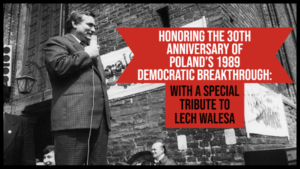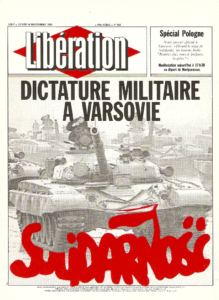Belarus: Lessons from Polish Solidarity https://t.co/colC8cgOHW
— Democracy Digest (@demdigest) August 31, 2020
Lech Walesa on Monday warned against populism as his deeply divided country marked 40 years since a landmark deal gave rise to the freedom-fighting Solidarity trade union, AFP reports. Concerns over the health of Poland’s democracy have mounted since 2015 when the right-wing populist Law and Justice (PiS) won office and began introducing controversial reforms, criticized both at home and abroad.
 “People today are electing populists and demagogues because they promise change… they (populists) have correctly diagnosed (today’s problems) but their cure is wrong,” Walesa told hundreds gathered at the historic Gdansk shipyard. “We need to take over the initiative from these populists and demagogues and replace it with wiser solutions and better structures,” he added.
“People today are electing populists and demagogues because they promise change… they (populists) have correctly diagnosed (today’s problems) but their cure is wrong,” Walesa told hundreds gathered at the historic Gdansk shipyard. “We need to take over the initiative from these populists and demagogues and replace it with wiser solutions and better structures,” he added.
“We underestimated democracy in Poland and allowed populists and demagogues to influence the election,” he told a National Endowment for Democracy forum. “You have to do everything you can to prevent this. … If you underestimate democracy, you will be in trouble.”
There are unexpectedly many similarities between what is going on in Belarus now and what was taking place in Poland in 1980, argues Andrzej Sadoś, Poland’s permanent representative to the European Union. The peaceful awakening in Belarus deserves Europe’s backing, including expert and financial help, he writes.
The political situation in Belarus is indeed reminiscent of the birth of Solidarity, 30 years ago on August 31, 1980, says Bernard Guetta, MEP for the Renew group, who covered the events as Le Monde’s correspondent in Poland:
That’s exactly what happened when, at Gdańsk, the workers of the Lenin shipyard relaunched the July strikes and in less than a week Poland was on general strike, one big factory after the other¸ one city after the other. What happened in Belarus reminded me of that Polish moment because from one hour to the next everything changed.

Screen capture
Walesa, a 35-year-old electrician at the yard who had been fired four years earlier for activism, scaled the huge site’s outer wall and took the lead of the strikers, emerging as a charismatic speaker, AFP adds:
The management gave in very quickly on several points, but the strikers wanted more, and in particular the creation of free unions. The strike quickly took on a political dimension with the arrival on site of dissident intellectuals, who adopt an advisory role to the strikers. The workers had in their minds the bloody repression of the strikes of December 1970 — the uprising at the Gdansk shipyards had led to the fall of the leader of the Communist Party, Wladyslaw Gomulka.
The current Solidarity leader, Piotr Duda, said during Gdansk ceremonies that the union will try to bring assistance to protesters in Belarus, AP reports.
“Our hearts and eyes are focused on Belarus, where they are having their August now and where they should not be short of solidarity, spelled with the small s and the big S,” Duda said.
“What made it special was that the movement was driven by workers. That gave it its impetus and power,” historian Peter Oliver Loew, the director of the German Poland Institute, tells Deutsche Welle.
“When a couple of intellectuals take to the streets, it doesn’t make a revolution. But when there is a strike at a business that a state relies on for part of its revenue, it very much calls into question a communist system that legitimates itself by claiming to represent the proletariat,” says Loew, who sees many parallels between Solidarnosc and the current wave of protests in Belarus.







